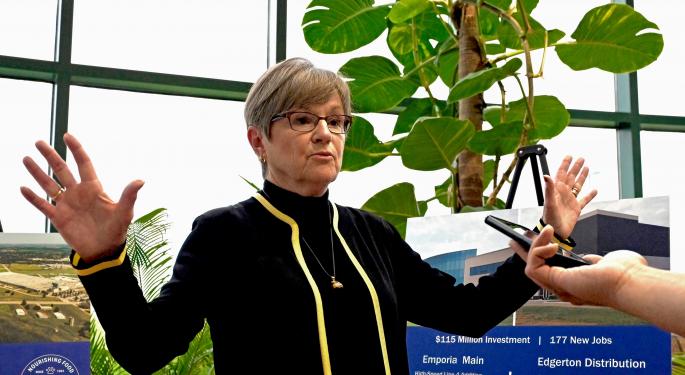Kansas Gov Laura Kelly On Tax Cuts, Medicaid And The Lone Midwestern State With No Medical Marijuana
Kansas Governor Laura Kelly's political agenda recently took center stage as she unveiled a comprehensive tax cut plan alongside bipartisan lawmakers.
Emphasizing a fiscally responsible approach, Democratic Gov. Kelly stated: "We’re going to put money back in your pockets this year. And we’re going to do it in a fiscally responsible, targeted, and sustainable way."
The 2024 proposed tax plan addresses multiple issues, including eliminating taxes on groceries and Social Security income as well as significantly raising the residential exemption for property taxes.
See Also: US Losing $8.5B In Cannabis Taxes Due To Lack Of Federal Legalization, New Taxation 'Blueprint'
Healthcare Reform And Marijuana Legislation
Gov. Kelly said she continues to champion Medicaid expansion, aligning with her push for comprehensive healthcare reform.
This stands in contrast to the persistent prohibition of medical marijuana in Kansas, making it one of the few states where cannabis remains entirely illegal.
Public Opinion And Shifting Political Landscape
Public opinion in Kansas, as reflected in a recent Fort Hays State University survey, showed significant support for ending the legislative blockade on bills legalizing recreational marijuana and expanding Medicaid eligibility.
Notably, Kansas Senate President Ty Masterson expressed his willingness to consider legalizing medical marijuana, signaling a potential shift in the political landscape. The upcoming legislative session may see renewed debate on this issue, reflecting both a change in public opinion and evolving political attitudes.
Opposition to the Flat Tax and Fiscal Responsibility: As the legislature prepares to convene, Gov. Kelly staunchly opposed the notion of a ‘flat tax’, citing its potential adverse effects based on the experiences of other states. “Across the country, there is no evidence to suggest that a flat tax does anything to drive economic growth or reduce unemployment. States that have experimented with that type of regressive tax, often with disastrous results,” she said.
Yesterday, I joined bipartisan legislators to share how we'll save Kansans $1 BILLION over the next 3 years — without threatening our ability to fully fund our schools. Let's dive into the details of this responsible, middle-of-the-road proposal. pic.twitter.com/5o1DN4NADM
— Governor Laura Kelly (@GovLauraKelly) January 9, 2024
recreational marijuana and expanding Medicaid eligibility.
Read Next: 219M People Worldwide Consume Marijuana As Opioids Cause Greatest Harm, Confirms New UN Report
Image by Mark Reinstein on Shutterstock
© 2025 Benzinga.com. Benzinga does not provide investment advice. All rights reserved.
Posted-In: cannabis in kansasCannabis Government News Regulations Politics Markets General



